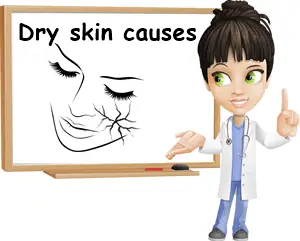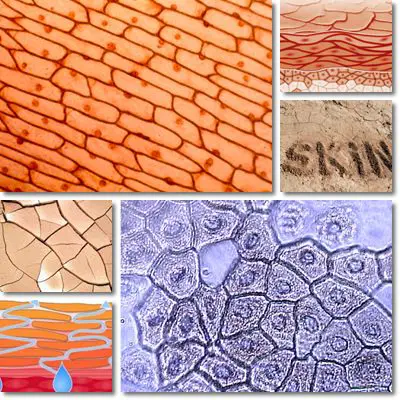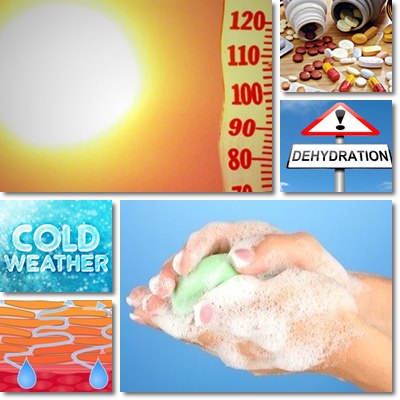Despite all the drama with oily skin, dry skin doesn’t feel any better. People with dry skin are always left feeling a sort of unpleasant tightness, may experience extreme exfoliation, roughness, even cracks and overall discomfort.
Depending on the how dry the skin is, other symptoms such as redness or itching may appear. Causes are diverse and may range from unfavorable weather conditions to skin disorders such as eczema, psoriasis or be a symptom of an entirely unrelated condition, thyroid hormone imbalance or nutritional deficiencies.
What we eat can also determine just how dry our skin will be.
Certain nutrients can help us achieve better skin health and keep its somewhat natural tendency towards dryness under control.
Vitamins A, C and E are only some of the nutrients we desperately need for healthy skin. Their action makes even the driest skin improve its capacity to retain moisture and remain better hydrated, thus contributing to an improved appearance and feel.
Lastly, proper care, adequate washing and skin care routines, use of emollients and simply avoiding products that encourage our skin to dry out is another vitally important aspect when dealing with dry skin.

What is dry skin?
In simple terms, our skin is considered to be dry when the epidermis (the outermost layer of the skin) doesn’t retain enough water.
Different degrees of dryness come with different symptoms, some more uncomfortable than others. Depending on how dry one’s skin is and what is causing it to be this way, we may experience one or more of the following signs and symptoms: feeling of tightness, a rough feel to the skin, dry patches and peeling, flaky appearance, itching, with or without redness, a strong need to scratch the dry areas, cracks, breaks and possibly bleeding and discomfort. Infections may develop if the symptoms are not properly managed.
Flaky skin is often seen appearing on the scalp, but can occur at the level of the face too when skin is too dry.
Dry, flaky areas are often seen in more sensitive parts such as on the lips, elbows, the areas between the apples of the cheeks and jawline, scalp, palms and back of the hands, heels, lower legs.
It is common for dry lips to develop cracks and bleed due to how thin and sensitive their skin is.
However, cracks and bleeding in any other area of the body, especially ones that occur seemingly inexplicably and do not heal, are best investigated by a doctor.
Heels are also very likely to become rough and suffer from cracks, while the face and hands may peel extensively.
Peeling from sunburn and peeling as a result of dry skin are different. Itching may also develop and is a mechanism meant to help us get rid of the dead skin cells that are shed and allow new skin to take their place.
Redness may occur if we scratch too much or too hard. Rashes may be a sign of infection and any suspicious symptom is best checked out by a doctor.

Dry Skin List of causes
There are a variety of causes behind dry skin and include unfavorable weather conditions, skin disorders proper, other medical conditions or side effects of certain medication, nutrient deficiencies and improper skin care routines.
1) Low temperature and low humidity
Cold weather is a major cause of dry skin and a reason why most people suffer from it during winter. Also, in the cold season there is extensive use of radiators and heaters which dry out the air and reduce air humidity levels, further contributing to dry skin. Using room humidifiers or vaporizers can help.
2) Windy and extremely hot weather
Windy weather is harsh on exposed skin, causing it to lose moisture and become dry. Direct exposure to strong wind causes chapped lips, dry eyes, face and hands. Hot weather can be just as problematic for our skin, drawing out moisture and leaving it dry.
3) Skin disorders
Certain skin conditions such as atopic dermatitis, eczema, psoriasis, rashes, acne etc. can easily result in dry skin. Addressing the underlying condition can help improve symptoms and quality of life.
4) Other medical issues
Dry skin can be a less known symptom of diabetes, thyroid hormone imbalance resulting in both an underactive and overactive thyroid gland (hypothyroidism and hyperthyroidism), pituitary gland hormone imbalance, autoimmune disorders, allergies, malnutrition, malabsorption problems etc.
5) Medicine side effects
High blood pressure medication, cholesterol and allergy medication, topical preparations for acne treatment etc. can all cause our skin to become dry, exfoliate and feel tight and unpleasant.
6) Irritant chemicals
Cleaning products, fabric softeners, dish detergents, hand sanitizers etc. all contain chemicals that may have adverse reactions, irritating our skin and causing it to become dry.
Such products are intended from the beginning to be harsh, strip our skin of its natural oils and ability to retain moisture. Something as sensitive as skin risks more damage the more it is exposed to them.
7) Genetics
There is a genetic predisposition for dry skin just as it is for oily skin. So if members of our family tend to have dry skin, we too are most likely to inherit this as a dominant trait.
Moreover, a family history of skin conditions such as eczema or psoriasis may have us at a higher risk for such conditions and their effects, dry skin included, than others without a family history.

8) Old age
The older we get, the more our body changes. And one of these changes is that our skin becomes thinner, is no longer as efficient as it used to be at retaining moisture, hence its tendency to become drier. Adequate care and good nutrition are the best ways to manage and treat dry skin.
9) Washing too frequently and using improper skin care products
Having dry skin means having less natural oils to help it retain moisture. Washing too often puts us at risk of losing even more of these vital oils and, along with them, the water in our skin.
This results in dryness and other symptoms. Using products that are too harsh on or not suited for our skin type (particularly solid soaps) can enhance skin dryness.
Showering with extremely hot water opens pores and lets moisture escape from the skin, while excessive exfoliating (even rubbing with a rough towel) can damage the skin and cause it to break, loose its natural oils and moisture and become dry.
Because skin can become abnormally dry even with an adequate washing routine, it is important to use moisturizers such as natural oils to help it regain its feel.
10) Vitamin deficiencies
Dry skin may be caused by vitamin deficiencies, notably a shortage of vitamins A, C and E. Vitamin A normally is directly involved in the growth and repair of skin cells and a shortage can lead to skin problems such as dry, thin skin, dry eyes and hair and brittle nails.
Vitamin E is a lipid and lipids help retain moisture in our skin, preventing it from drying. Vitamin C boasts wonderful restorative properties and can help repair and strengthen broken, damaged skin, allowing it to balance its moisture content. B vitamins and vitamin D also contribute immensely to skin health.
11) Dietary mineral deficiencies
Iodine is a nutrient of great importance for good thyroid function, helping prevent dry skin associate with thyroid hormone imbalances. Sodium favors water retention in the body, contributing to proper hydration, provided it is consumed in small amounts.
Potassium is an electrolyte responsible for maintaining fluid balance in the body (by regulating sodium action) and can thus contribute to managing dry skin. Zinc is efficient against acne and protects vulnerable skin against infection, working closely together with vitamin A.
12) Lack of essential fatty acids
Fats (lipids) are important because they help our skin retain water and stay hydrated. People with a very low intake of healthy dietary fats often experience dull, dry skin and hair. Having an adequate intake can leave our skin looking refreshed, plump, youthful and healthy.
13) Dehydration
Our skin and mucous membranes (eyes, throat etc.) rely heavily on a sufficient intake of fluids to remain healthy and functional. Not drinking enough water, intense sweating, hot temperatures, too little dietary sodium, not enough potassium can promote dehydration and affect skin health.
14) Bad dietary habits
Not getting all the nutrients we need from the foods we eat means we expose ourselves to nutrient deficiencies and risk getting dry skin along with other more serious effects that have to do with poor nutrition.
Conclusion
Having dry skin can be a mere trait or an uncomfortable health issue. Adapting our washing routine to our skin’s needs, using skin care products suited for our skin type, moisturizing, staying hydrated and avoiding harsh weather conditions and irritant household cleaning products as well as eating right are important aspects to consider when looking to manage and treat dry skin. Learning the causes behind dry skin is a first step towards better skin health.
